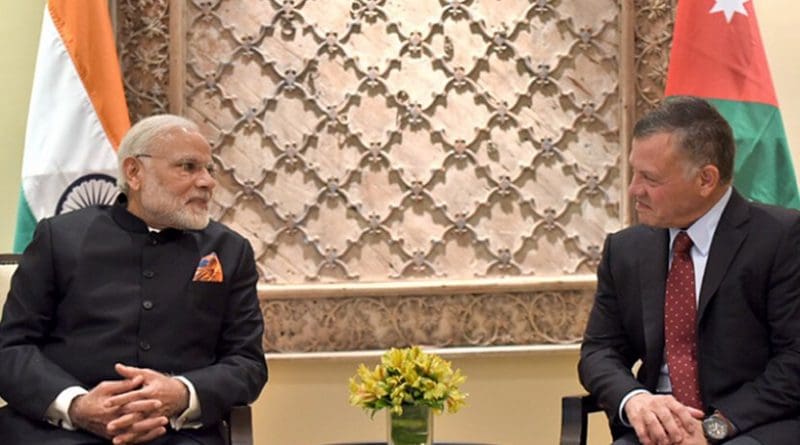Jordan Is More Than A Transit Point – Analysis
By Manohar Parrikar Institute for Defence Studies and Analyses (MP-IDSA)
By P.R. Kumaraswamy*
In their eagerness to focus on and flag the de-hyphenation of the traditional Israel-Palestinian binary, most commentators have forgotten the pivotal role of the Hashemite Kingdom of Jordan. First is the geographical constraint. Whether it is the Gaza Strip or West Bank, one could not visit the Palestinian territories, without transiting through a third country. One could visit either of these areas through Israel; the Gaza Strip is about two hours’ drive from Ben-Gurion airport, and Ramallah, the headquarters of the Palestine National Authority, is about 13 kilometres away from the centre of Jerusalem. But the political distance is larger and more complicated, especially when one intends to travel to Palestine without visiting Israel, as Prime Minister Narendra Modi did last week. That leaves only Egypt and Jordan as possible transit points for the Gaza Strip and West Bank, respectively.
The geographic situation is compounded by the infrastructure or lack of it in both these areas. With much fanfare, the Gaza International Airport was opened on 24 November 1998 in the wake of the Oslo agreements and many Palestinians saw it as a tangible sign of statehood. Such optimism was buried when the al-Aqsa intifada broke out in September 2000 and periodic violence saw the radar and runways being destroyed by Israeli air strikes. Thus, the land route from the Rafah Crossing between Egypt and the Gaza Strip became the only entry point both for the Palestinians and outside visitors if they wished to avoid coming to Gaza through Israel.
Entering the West Bank is, however, more complicated. As a landlocked area, its only access to the outside world has been through Jordan. Prior to the June War, when the West Bank was part of the Hashemite Kingdom, Palestinians travelled abroad through the Allenby Crossing which had been operational since the days of the Ottoman Empire. After the June War and Israeli occupation of the West Bank, Palestinians used this crossing to go to Jordan and from there to other countries. After the Israel-Jordan peace treaty, to facilitate the flow of Israeli tourists, Jordan opened two other border crossings to the North and South of the Allenby Crossing, now called King Hussein Crossing. Unlike the Gaza Strip, however, the West Bank does not have an airport, except a heliport in the Mukata’a or the headquarters of the Palestine National Authority (PNA) in Ramallah.
Prime Minister Modi could thus either opt for a road journey through the King Hussein Bridge or the helicopter ride to Ramallah. Both required transiting through Jordan and, after landing in Amman, Modi was ferried to Ramallah by a Jordanian army helicopter. Thus, even if he managed to de-hyphenate Israel from Palestine, Modi could not de-hyphenate Palestine from Jordan.
While a standalone visit to Israel is indeed possible, a similar effort vis-à-vis Palestine is a logistical nightmare. Indian visitors to the Palestinian territories often included Jordan in their itinerary. The visits of External Affairs Ministers S M Krishna in January 2012 and Sushma Swaraj in January 2016 and President Pranab Mukherjee in October 2015 included Jordan, besides Israel and Palestine. The same is the case with Prime Minister Modi’s visit to Palestine.
Besides transit facilities in Amman, Prime Minister Modi also needed Jordanian logistical support to reach Ramallah. Hence, he stayed overnight in Jordan, including a hastily arranged meeting with King Abdullah. Surprisingly, the pre-visit media briefing by the External Affairs Ministry did not even refer to Jordan and continued to refer to Modi’s trip as a three-nation visit comprising only of Palestine, the UAE and Oman.
How does one explain this turning of the Nelson’s Eye towards objective realities? Since the early 1920s, Indian nationalists were never enamoured of the Hashemites, then the rulers of the Hejaz region which also includes Mecca and Medina. The Arab Revolt of 1916 spearheaded by Sharif Hussein of Mecca—the great-great-grandfather of the present King—did not go down well with the Indian nationalists who saw it as a British-inspired conspiracy against the Ottoman sultan-cum-caliph. In later years, this jaundiced view transformed into Indian disapproval of Jordan being a pro-Western monarchy in the post-Second World War Middle Eastern order.
India’s normalization of relations with Israel in 1992 and the bonhomie generated by the Oslo process meant that the mandarins felt comfortable dealing with Israel and Palestine while disregarding the geographic compulsions. While Amman was used as a transit point for visits to the region, India never recognized the importance of Jordan vis-à-vis the Palestinian cause. Unlike his father, King Abdullah does not wish to return to the pre-June 1967 position of Jordanian rule over the West Bank. With a sizeable number of Jordanians of Palestinian origin, such a policy would be a curse than a blessing. At the same time, a greater Jordanian role is a pre-condition for Palestinian statehood, both for logistical as well as developmental considerations. Bluntly put, Indian assistance to the Palestinians could not be routed through Israel without political controversy both at home and abroad, and India cannot help the Palestinians constructively without coordinating with Jordan.
Since his election in May 2014, the brief late evening conversation in Amman last week was Modi’s first meeting with King Abdullah. Indeed, the Jordanian monarch’s visit to New Delhi has been talked about since late 2016 but has remained stuck in the gridlocks of the Indian bureaucracy. Having enjoyed Abdullah’s hospitality en route to Ramallah, will Modi recognize that Jordan is more than a transit point?
Views expressed are of the author and do not necessarily reflect the views of the IDSA or of the Government of India.
About the author:
*P.R. Kumaraswamy is Professor of Middle Eastern Studies at Jawaharlal Nehru University, New Delhi.
Source:
This article was published by IDSA.

